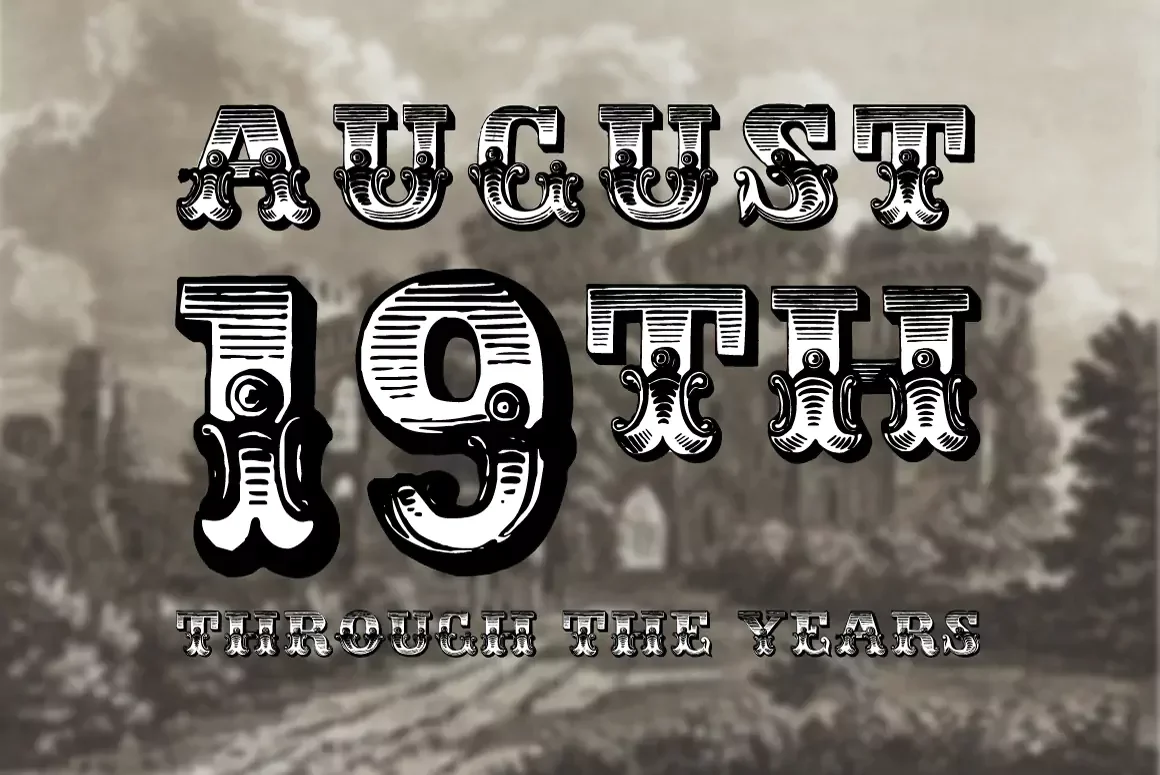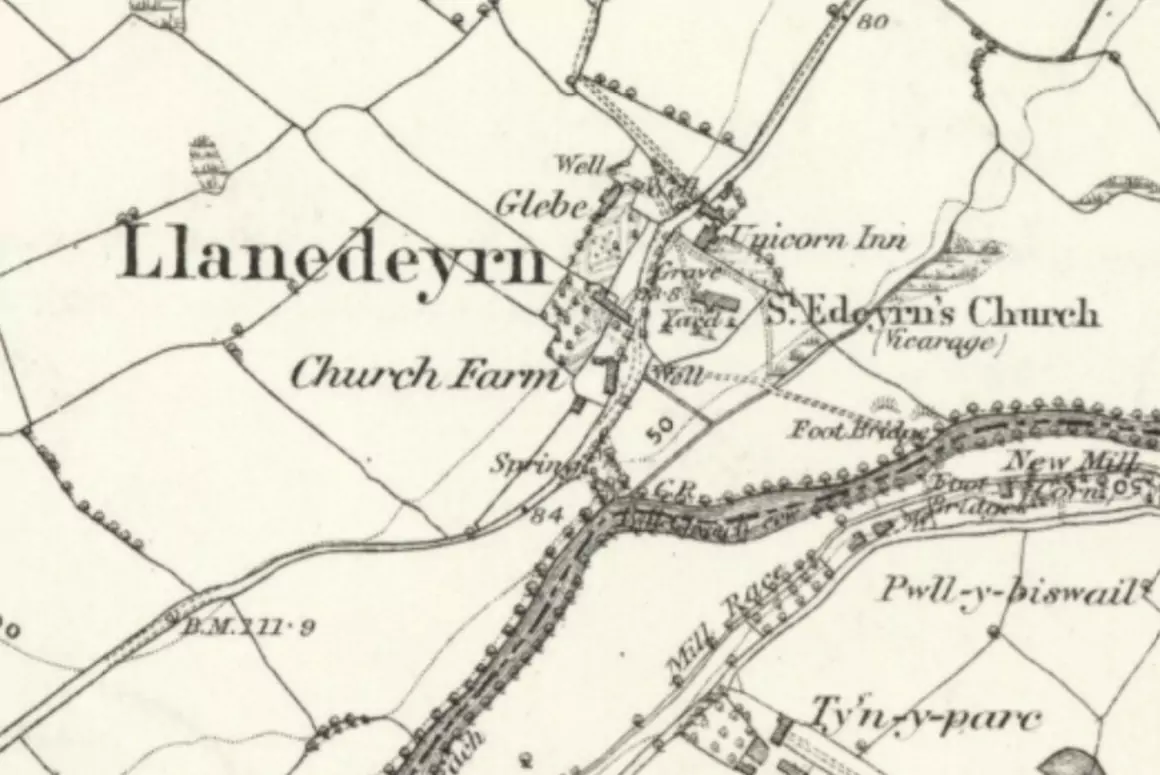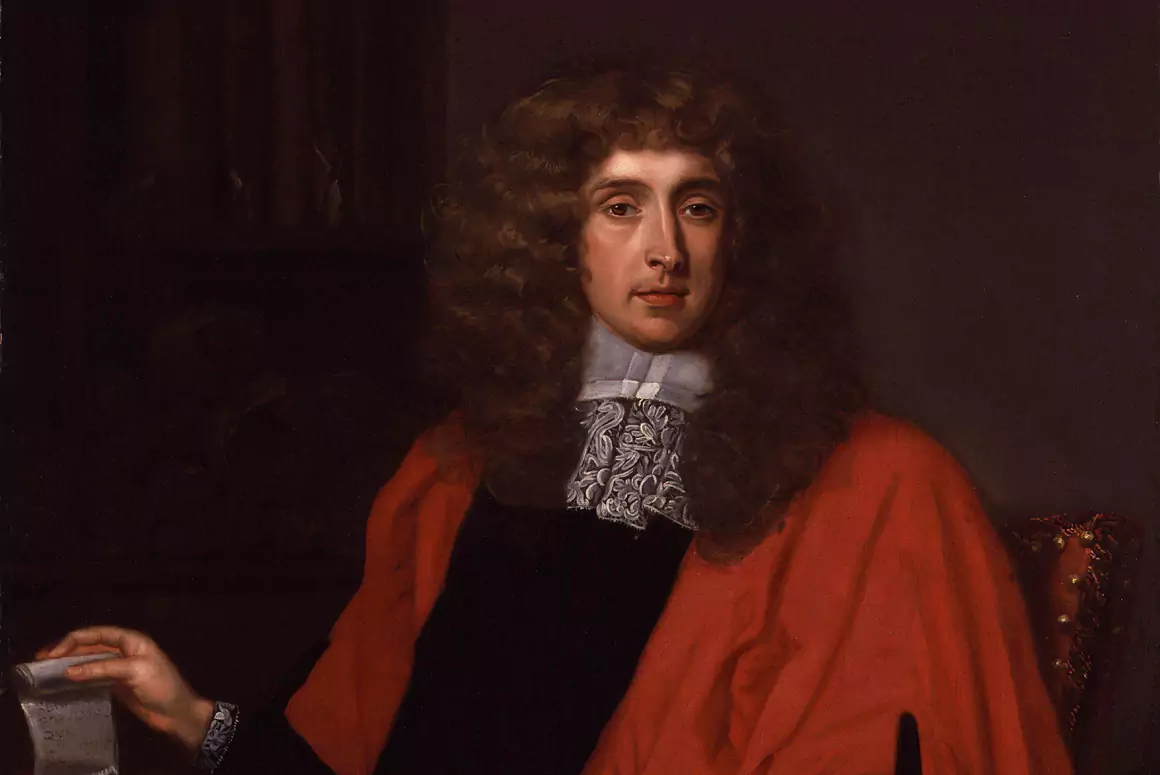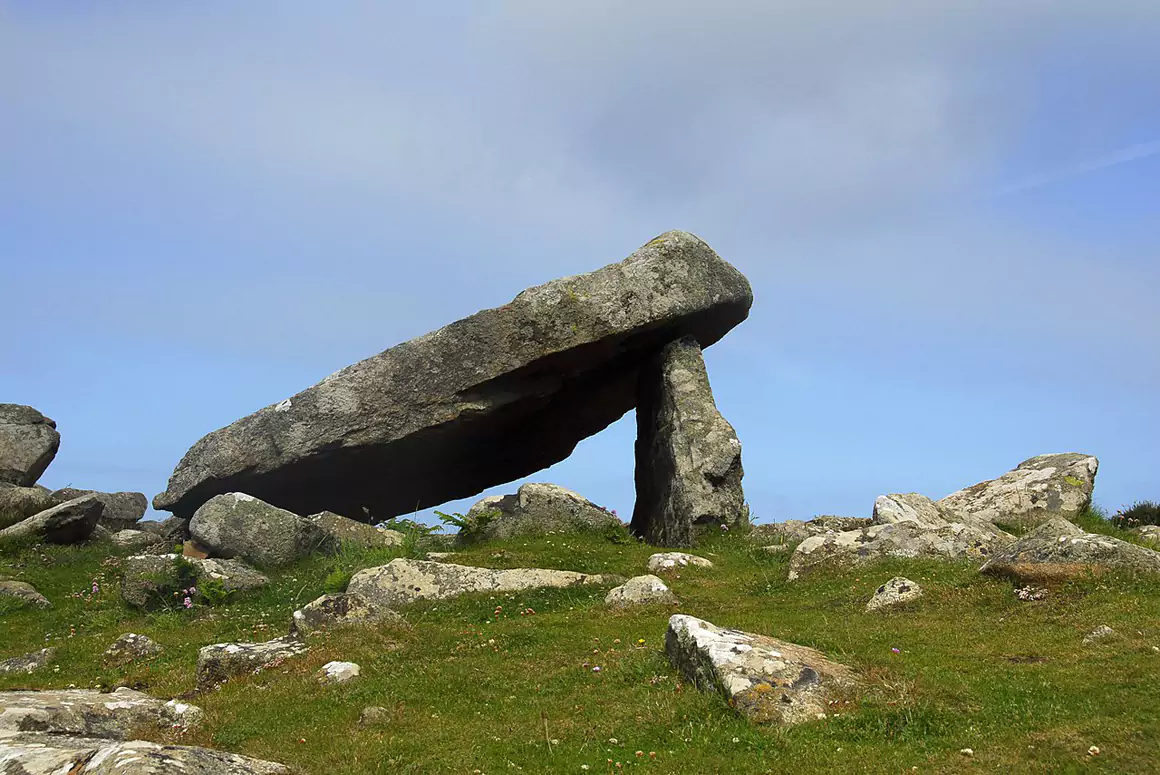It was June 1646 when parliamentarian forces under Sir Thomas Morgan and Sir Trevor Williams arrived at Raglan Castle and the siege of Raglan began.
The remains of a fort built opposite the Castle’s gatehouse can still be seen today. It was from this fort that the Parliamentarians bombarded the castle.
In August General Thomas Fairfax with his Parliamentarian forces arrived and placed trench mortars targeting Raglan Castle’s interior.
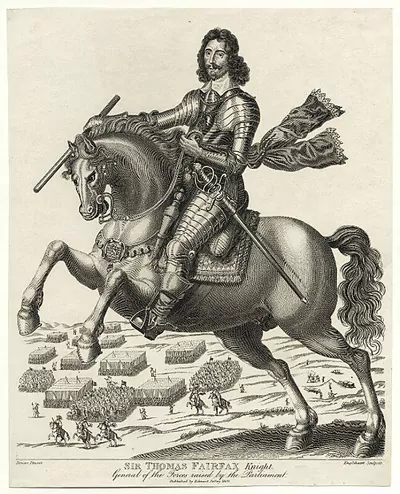
The Parliamentarians brought new artillery to this war casting huge cannons or trench mortars which flung 90kg gunpowder filled cannon balls. It is unknown if this mortar was the same as used just down the road at Goodrich which was given the name “Roaring Meg”.
Needless to say the Royalists headed by the Marquess of Worcester realised that their situation was hopeless and surrendered the castle to Fairfax on 19 August 1646.
It was a couple of centuries later that The Tenby Observer published on 26th August 1880 told their readers of the Police Court held on the previous Thursday August 19th.
Before Dr. Dyster (in the chair), E. R. Power and C. Allen, Esqrs.] Joseph Roberts and William Fielding were summoned by Head Constable Hodges, charged with wilfully and unlawfully obstructing the High Street on the 14th inst., by selling certain goods there. Defendant’s aid not appear (long before the advent of duty solicitors). Service of summons having been proved, Head Constable Hodges stated the facts of the case, and defendants were each fined 10s (Shillings equivalent of 5 pence today) and costs of 6s in default of distress, fourteen days’ imprisonment. James Thomas was summoned for being drunk. Defendant pleaded guilty, and was fined (in consequence of a previous conviction this year) 10s and costs of 5s which was paid. David Thomas, charged with a similar offence, said he could not say he was sober as he had had a glass of beer. Fined 5s and costs of 5s again paid. William Jenkins was charged with being drunk and riotous. Pleaded guilty, and was fined 10s plus costs of 5s, or fourteen days’ imprisonment. (William Jenkins took the option of the fine) and paid. Henry Davies and Catherine Davies, his wife, were charged with being drunk and using obscene language. Both pleaded guilty, and were bound over to be of good behaviour for the next six months; each to find one surety of £5.00, and himself and herself in £10.00.

One could question if Tenby has changed much in some aspects over the last 140 years.
Another example of things not seeming to change much is given to us by The Cardiff Times of 19th August 1905. From their column named Welsh Gleanings – News and Views in a Lighter Vein.
The Cardiff Corporation picnic to Ireland to congratulate the Marquis and Marchioness of Bate upon their wedding cost the ratepayers (including the address) the sum of £50.
News then was very different to today and also part of these Welsh Gleanings.
Morien returned home from the Mountain Ash Eisteddfod the other night in the sweetest of tempers, his head filled with the music of the choirs, and his heart overflowing with sentiments of patriotism. A few minutes later he was almost rent with fierce indignation. During his absence thieves bad broken into his kitchen garden and robbed him of some of his finest potatoes.
We have no proof and it is very much an assumption that Morien could be Owen Morgan who was often referred to by his bardic name Morien. He was a journalist working for The Western Mail.
Carmarthen goes in for tall things. Nott’s Monument is tall, but the Fallen Heroes’ Monument will be a foot taller. It will be 20 feet and a half in height. someday perhaps Carmarthen will muster sufficient courage to invite the National Eisteddfod there.
This snippet from the same Welsh Gleanings really raises more questions than it answers.
To put this into a little context, Nott’s Monument recognises Major-General Sir William Nott who was famed for his colonial military exploits in the 1840s. The Fallen Heroes monument is Boer War memorial situated in the centre of Guildhall Square Carmarthen.
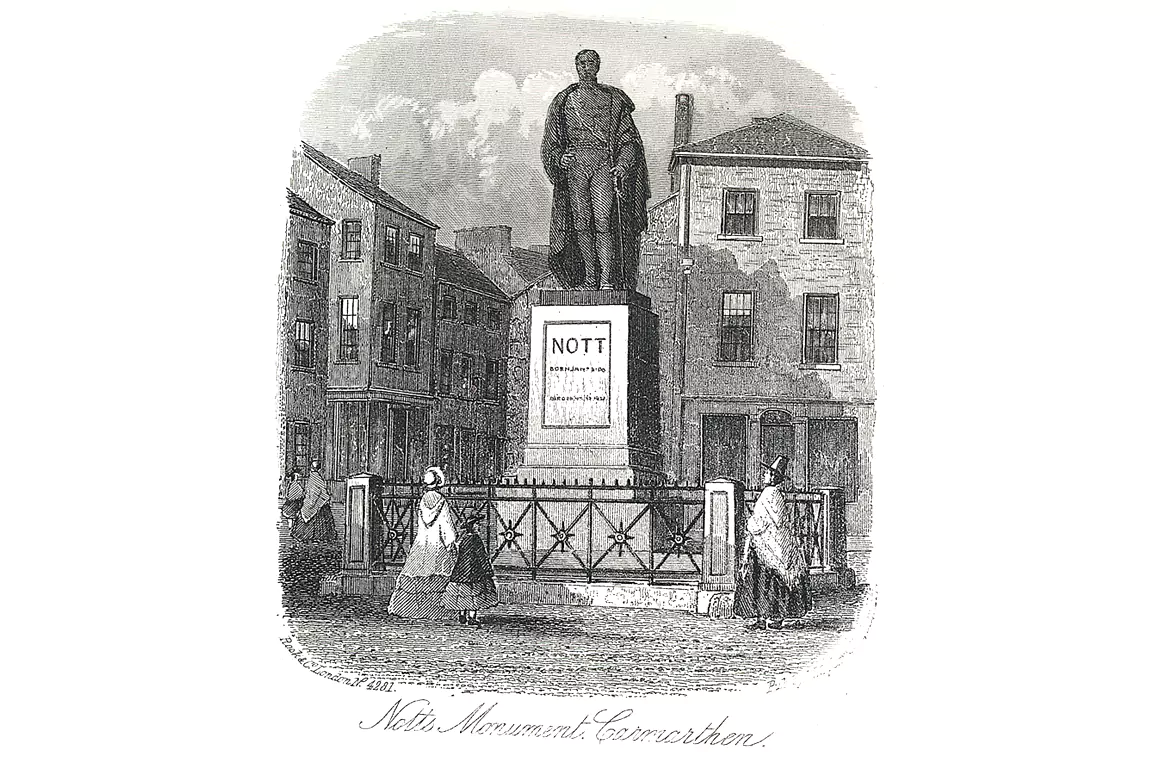
The sarcasm though about Carmarthen not holding the National Eisteddfod is not readily understood. The National Eisteddfod was hosted by Carmarthen 6 years later in 1911.
Staying loosely with the theme of monuments of one sort or another.
In the column Notes from Prestatyn the Rhyl Record and Advertiser of 19th August 1899 further shows the very different way that news is reported today.
NOTES FROM PRESTATYN. (By DEWI WYLLT)
Among the victims in the electric tram accident in Liverpool on Saturday, was Mrs Hughes, of Prestatyn. She was severely shaken and bruised, but is now making satisfactory progress to recovery.
The Jubilee Fountain which Mrs McLaren promised to present to Prestatyn, has arrived and has been fixed on the shore. It is a hand- some and ornamental structure of highly polished granite. The design is exceedingly neat and artistic. Two drinking cups are affixed to it, and also two troughs for animals Both residents and visitors alike have ex- pressed their admiration of it. It is proposed to have a little public function by way of opening it, and Mr John Jones, J.P. Chairman of the Urban District Council has been asked to perform the ceremony.

The next item really needs some explanation as to its understanding of today.
Under the Elementary Education Act 1870, it was allowed for the establishment of School Boards in areas letting them charge a rate for the financial operations of a school.
The amount of money refers to a tax levy of, in this instance, 3d or 2s per pound assessed to property value funding the local school board.
This rate was a key part of the funding mechanism for providing elementary education in England and Wales.
Further Saturday August 26th, and not Monday August 28th, as previously announced, has l been fixed as the date of the School Board Election at Prestatyn. The nominations took place on Tuesday. On the previous evening the two parties held meetings to select their champions. The Progressives selected the Rev F. Jewell, Messrs G. O. Jones, and Peter Ellis. The Church Party made an extraordinary selection With Mr W- H. Coward, J.P., of course, it is impossible to find fault because he is a consistent Churchman. But the other two candidates, viz., Messrs John Pritchard, and T. Roberts, grocer, are in strange company. The former is a deacon with the Congregationalists, and the latter, I believe, springs out of a Nonconformist stock. However, there may be some alteration between now and the polling day, for the Church party have also taken the precaution to have Mr T. J. Scott nominated. The probability is that though selected. Mr Roberts will be induced to withdraw in favour of Mr Scott. Mr Martin O’Connor, of the Victoria Hotel, has also been nominated, whether as a Roman Catholic candidate or an Independent I do not know. Anyhow he is opposed to the School Board policy, and will join in the attempt to prevent it being carried out. The issue before the electors is a very clear one. The three candidates selected by the Progressives are pledged to work the School Board on a threepenny rate, and they should be given the opportunity of carrying out their promise. On the other hand the candidates selected by the Church party have declared over and over again that the School Board will cost 2s. in the £ It may be depended upon that if they are returned they will do their utmost to run the rate up to that figure in order to justify their prophesies. Consequently what the ratepayers have to consider is will they vote for men who are determined to make the rate 2s in the £ or will they vote for candidates who will undertake to work the School Board on a threepenny rate. It is a. serious matter for them to decide, and I bop& that on Saturday week they will decide against a 2s rate by voting for the Rev F. Jewell, Mr G. O. Jones, and Mr Peter Ellis.
All of this shows that over the many decades or even centuries the news often is the same but it is the way of reporting that is certainly different.
Our thanks to The National Library of Wales and their collection of Welsh Newspapers.


